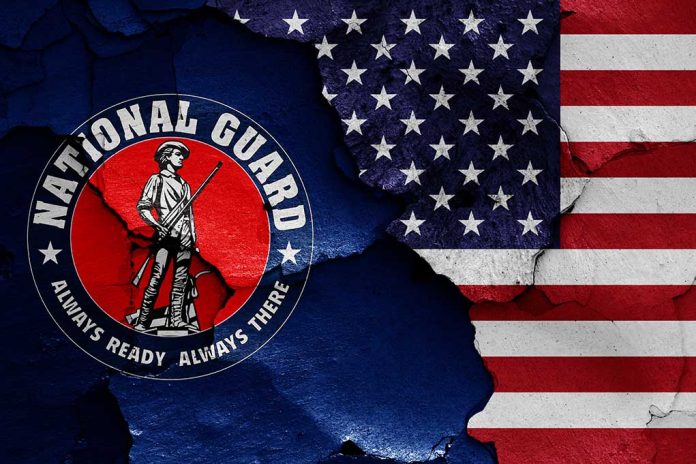
New Mexico is deploying 60-70 National Guard troops to Albuquerque to combat a devastating juvenile crime wave and fentanyl epidemic, but Republican critics claim the measure falls far short of addressing the root causes plaguing the city.
Key Takeaways
- Governor Michelle Lujan Grisham has ordered National Guard deployment to assist with traffic control and prisoner transfers, not direct crime intervention.
- Republican leaders criticize the plan as insufficient without bail reform and stricter penalties for offenders.
- Albuquerque police have arrested or cited 2,600 minors aged 11-17 in the past five years, highlighting the severity of juvenile crime.
- Fentanyl was involved in 65% of overdose deaths in New Mexico in 2023, with recent operations seizing 2,700 pills.
- National Guard members will be unarmed and in civilian clothing to minimize community disruption.
National Guard Called In As Crime Overwhelms Local Police
Governor Michelle Lujan Grisham’s executive order will deploy National Guard personnel to Albuquerque by mid-May, targeting what she described as “critical issues requiring immediate intervention.” Rather than directly engaging with criminals, the National Guard will handle supportive functions like scene security, traffic control, and prisoner transport. This approach aims to free up trained police officers to focus on more critical law enforcement duties in a city grappling with both juvenile crime and a deadly drug epidemic.
The move comes as Albuquerque’s crime statistics paint a troubling picture. Since 2019, city police have arrested or cited 2,600 minors between ages 11 and 17. In one particularly disturbing case, a 13-year-old boy was recently charged with first-degree murder after a fatal car accident and has been linked to multiple burglaries. Meanwhile, Operation Route 66, a targeted effort against drug trafficking, has resulted in nearly 400 arrests and the seizure of 2,700 fentanyl pills according to Bernalillo County Sheriff John Allen.
If crime in ABQ is down, then why do we need the National Guard to assist APD with handling crime?#nmpol #kellerkrime @NicoleforNM @MayorKeller pic.twitter.com/oCHjddA6G5
— New Mexico Senate Republicans (@NMSenate_GOP) April 9, 2025
Critics Call For Stronger Measures
While the National Guard deployment represents a significant step, Republican leaders in New Mexico argue it fails to address more fundamental issues. Leticia Muñoz, Executive Director of the New Mexico Republican Party, has been particularly vocal about what she sees as an inadequate response to a multifaceted crisis. Her criticism centers on the need for systemic changes rather than temporary reinforcements. “No, this is definitely not enough. What this is, is you can see a mismanagement, obviously, of the mayor,” remarked Muñoz.
Muñoz has also taken aim at a proposed pilot program that would offer housing assistance to juvenile suspects after their release from detention, characterizing it as “coddling” young offenders rather than holding them accountable. This criticism reflects broader conservative concerns about the balance between rehabilitation and punishment in addressing juvenile crime, particularly in cases involving serious offenses.
Central Avenue’s Two-Mile Crisis Zone
A particularly troubled two-mile stretch of Central Avenue has become emblematic of Albuquerque’s challenges, with rampant homelessness and drug abuse creating daily difficulties for residents and business owners. Will Stephens, a retired chef who lives near this area, expressed frustration with the constant presence of drug users near his home but supports the deployment of National Guard members to assist police with the situation.
The fentanyl crisis has hit New Mexico particularly hard, with the synthetic opioid involved in 65% of overdose deaths in the state during 2023. The drug’s potency and widespread availability have created a public health emergency that compounds the crime problem. Despite these challenges, Albuquerque Mayor Tim Keller has pointed to some positive indicators, noting that crime rates have recently begun to decrease after decades of growth. The city administration views the National Guard deployment as a way to build on this fragile progress.
Civil Liberties Concerns Amid Expanded Enforcement
The deployment hasn’t been without controversy. The ACLU of New Mexico has raised concerns about potential civil rights violations that could accompany increased policing. To address some of these concerns, officials have specified that National Guard members will be unarmed and dressed in civilian clothing to minimize disruption to the community. This approach reflects an attempt to balance effective law enforcement with community sensitivities.
As National Guard members prepare to assume their supporting roles by mid-May, the question remains whether this deployment will represent a turning point in Albuquerque’s battle against juvenile crime and fentanyl, or merely a stopgap measure that fails to address more fundamental issues. For now, residents along Central Avenue and throughout the city remain hopeful but skeptical about the impact this unusual deployment will have on their daily lives and safety.
Sources:
National Guard to help Albuquerque fight crime, but some wonder if it’s necessary



